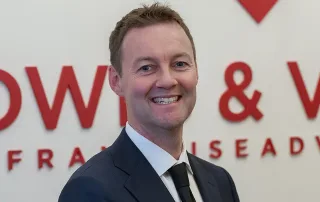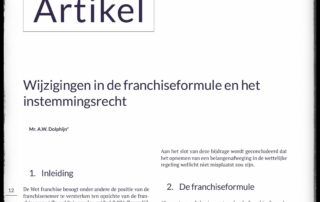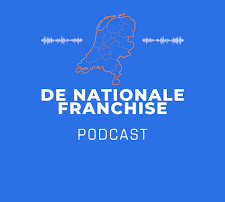(Directors’ and shareholders’) liability in the event of transfer or phasing out the franchise formula
On 18 May 2015, the Midden-Nederland District Court ruled (ECLI:NL:RBMNE:2015:1613) on a case in which the franchise formula was (indirectly) alienated to another organisation, apparently with the aim of dismantling the formula. The franchisees complained about this. In addition to the franchisor, could the director and shareholder of the selling franchisor also be held liable, as well as the director and shareholder of the acquiring franchisor?
Aegon was a director and shareholder of Financieel Verder BV and transferred its shares to Optima Holding BV on January 1, 2011. Optima Holding BV subsequently became sole director of Financieel Verder BV. In this way, control over the franchise formula of Financieel Verder BV has been transferred from Aegon to Optima Holding BV
The court ruled that the franchise formula was completely inextricably linked to the organization, name and brand of Aegon. After all, until January 1, 2011, Financieel Verder BV presented itself as “The franchise organization of Aegon”, the franchisees exclusively mediated in Aegon products, the support (organizational and in terms of supplying leads) came from Aegon (also a director of Financieel Verder BV). ) and Aegon was a shareholder of Financieel Verder BV As of April 1, 2011, all Aegon involvement in Financieel Verder BV ended. As a result, Financieel Verder BV could no longer fulfill its obligations towards its franchisees under the franchise agreements: after all, there was no longer any connection whatsoever with the organization, the name and the Aegon brand, while that connection was precisely an essential characteristic of the franchise agreement. This constitutes an attributable shortcoming on the part of Financieel Verder BV towards its franchisees. The fact that after April 1, 2011, franchisees were also allowed to mediate in Aegon products, in addition to products from suppliers other than Aegon, does not detract from this.
Now that liability has been established, the question is whether there are grounds for compensation for damage. The franchisees are offered compensation by Optima Holding BV. However, this compensation seems inadequate. The parties are continuing to litigate about the extent of the damage to be compensated by Financieel Verder BV to the franchisees.
Other important issues that were raised are director’s liability and shareholder’s liability. Both Aegon and Optima Holding BV are accused of being liable on the basis of an unlawful act as former director and shareholder, as successive director and shareholder, respectively. The reproach is essentially aimed at phasing out the franchise formula.
With regard to directors’ and officers’ liability, the criterion is that there must be serious (personal) blame. This relatively high threshold for directors’ liability is justified by the circumstance that the acts of the BV are the primary concern and the social interest in preventing directors from having their acts determined to an undesirable degree by defensive considerations, see Supreme Court 5 September 2014, ECLI:NL: HR:2014:2628.
Shareholders’ liability is in principle not liable, unless it should be qualified as a (actual) policymaker. In that case, under certain circumstances, the standard for directors’ liability could be adopted.
It follows from case law that the selling shareholder can be liable towards creditors if the seller can assume in advance that the creditors, such as franchisees, will be disadvantaged as a result. Under certain circumstances, the selling shareholder may be required to conduct some investigation into the intention of the buyer, see inter alia court Utrecht 25 May 2011, ECLI:NL:RBUTR:2011:BQ7136, Amsterdam District Court 25 January 2012, ECLI:NL:RBAMS:2012:BV6199 and Middelburg District Court 5 March 2012, ECLI:NL:RBMID:2012:BW4873.
The Court has taken as its assessment framework the judgment of HR 24 September 2004, ECLI:NL:HR:2004:AO9069 (Vleesmeesters/Alog), in which it is stated in short that the mere profiting of another party’s default is not unlawful, but that additional circumstances are required to classify such actions as unlawful. It may be questioned whether this assessment criterion used is the correct one and whether it should not have been assessed whether there was a (personal) serious reproach. The issue from the Vleesmeesters/Alog judgment pertained more to the aspect of favoring the third party involved. However, the driver’s advantage does not seem to be further substantiated here. Recently, on 2 February (2015 ECLI:NL:RBDHA:2015:2027), the District Court of The Hague still explicitly used the assessment criteria of (personal) serious culpability when asking whether a director of a legal entity was liable for the trademark infringement of the legal entity driven by him. See also a judgment of the District Court of Amsterdam dated 28 January 2015, ECLI:NL:RBAMS:2015:416, in which this standard of (personal) serious culpability was discussed in the case of a director of a franchisor.
In this case, the franchisees seem to have pointed to the special duty of care of a franchisor towards a franchisee with regard to these “additional circumstances”. In my view, this could indeed lead to liability.
The court rules that, precisely now that market conditions have explained the disappointing results of the leads and Optima Holding BV appears to be sufficiently solvent, it has not been demonstrated that there has been an unlawful act on the part of Aegon or Optima Holding BV. franchise agreement that it can be canceled with a minimum number of franchisees, which was (almost) the case.
It follows from this interesting statement that unilateral changes to the franchise formula, or the phasing out of the franchise formula, can lead to non-performance. It is also not inconceivable that the additional circumstance of the franchisor’s duty of care in franchise relationships may in certain cases result in an unlawful act for (alienating) directors and shareholders.
Mr AW Dolphijn – Franchise lawyer
Ludwig & Van Dam Franchise attorneys, franchise legal advice. Do you want to respond? Mail to dolphijn@ludwigvandam.nl

Other messages
Mitigation of fine due to ‘dominant position’ of franchisor
Mitigation of fine due to 'dominant position' of franchisor ...
It is a non-competition clause at the end of the lease
In the judgment of 26 March 2024, ECLI:NL:GHSHE:2024:1035, the Court ...
Looking ahead: Bottlenecks at the end of the franchise agreement
Of course, everyone starts a collaboration with good courage. But ...
Not just a successful appeal to incorrect forecasts
Not just a successful appeal to incorrect forecasts Introduction ...
Changes to the franchise formula and the right of consent
An article by Mr. was published in the leading legal ...
The National Franchise podcast
Guests on the National Franchise podcast are: Theodoor Ludwig ...







